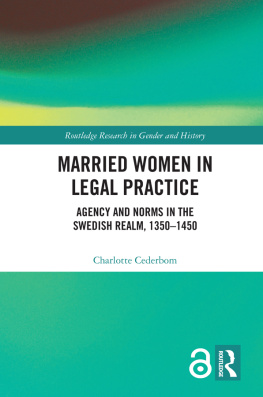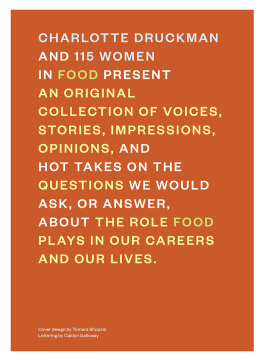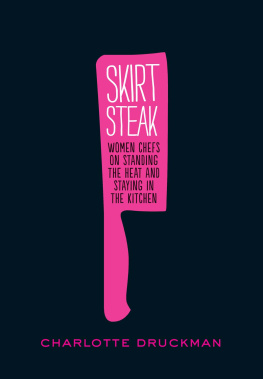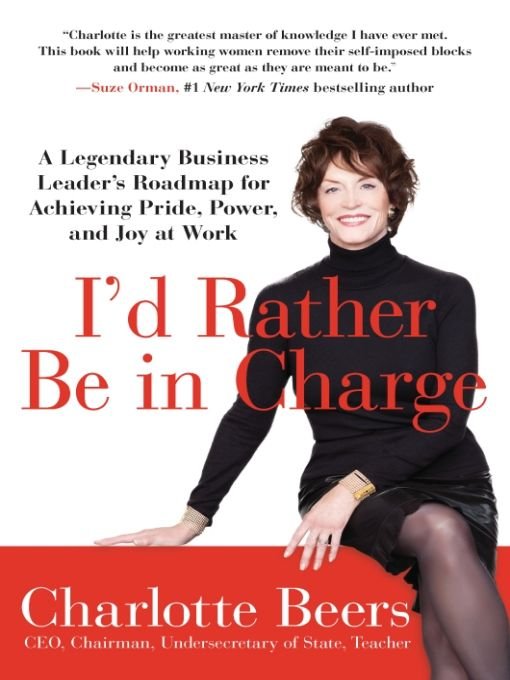Table of Contents
To all the men and women who taught me that our work was always worth doing well and that there could be as much laughter in the halls as there was grief, sweat, and tears
What I do is me; for this I came.
GERALD MANLEY HOPKINS
INTRODUCTION
In my work life, Ive held these titles:
Consumer research supervisor
Product manager
Management supervisor
Senior vice president
Senior partner
Chairman and chief executive officer
Undersecretary of state (I was under secretary of state Colin Powell.
Theyre very literal in government. )
Sometimes titles are not very descriptive. At one point in my career, friends changed my name from Charlotte to Shards (of glass), for breaking a number of glass ceilings. No one warned me that breaking glass ceilings meant standing in piles of broken glass, not upon a pedestal.
As a working woman, Ive been called:
Our puppy
Flamboyant flirt
Scarlet
Chair chick
Very steel magnolia
Hurricane Charlotte
Charismatic chief
In 1996 I was on the cover of Fortune magazine, framed by a gigantic headline, Women, Sex and Power. No wonder it was a best-selling issue. Thats a triple power cocktailwomen and power and sex. I knew and admired Pattie Sellars, the author of this groundbreaking article. Pattie passionately believes that women have a vital role to play in improving the workplace. But for this story, she got a little sensationalistic, pressing the people she interviewed about whether or not the star women she profiled, myself included, used their feminine wiles, good looks, or sexual fire to get an extra edge in the workplace. I wanted to kill her. We women had conquered vast, sometimes hostile territories at work with qualities like bravery, brains, and resilience, and I didnt want our accomplishments to be reduced to sex appeal.
In fact Ed Artzt, the chairman and CEO of Procter & Gamble, called me after being interviewed by Pattie. Your friend Sellars called, he said roughly. She asked me if you were sexy, he said.
I held my breath as Ed paused.
I told her you are about as sexy as a Mack truck, he said.
Ill take the woman who delivers with the strength and drive of a truck any day over the one who is seen as flirting her way to the top. I wouldnt mind adding to my list of titles the descriptor sexy as a Mack truck. Heres what I believe is sexy at work: being strong and committed and confident, being precisely who you are and in hot pursuit of the goals and ideas you believe in so much they captivate and inspire others.
Ive now embarked on yet another career, one that all my working years have prepared me well for, and which I feel is a privilege. My new job description: teacher.
In these pages I distill all Ive learned and witnessedfrom my own career, from other powerful men and women, and from the many executive women Ive worked with in my X Factor seminarsto show you how to discover your most effective, most powerful, most fulfilled working self. I want to show you how to lead, inspire, and influence othersmaybe only one or two others, maybe hundreds or thousands or even millions. You cant accomplish this without knowing deeply the authentic you at work.
Authentic is not form. Its content. Its about the irrepressible power of being your largest, truest self. And its something every leader has. If they were bells, theyd ring a true tone. They are completely who they are and sometimes even have to accept the consequences.
We women are not comfortable being little men, and we dont like being boxed into what is considered womanly at the expense of being seen as leaderly. (I think I made that word up.)
And work is, finally, all about relationships: with ourselves, our peers, and our superiors.
Id like to help you find your own unique, womanly way of leading. Id like to put you in that sexy Mack truck that deposits you at a job that draws on all of you and allows you to show the world all that you can be.
I
PERSONAL
ENVIRONMENT
Its Not About the Work
THE END OF MEN, the magazine cover blared from the newsstand. It stopped me in my tracks. This was certainly a bold message that women are taking control of, well, almost everything. Of course I bought that August 2010 issue of the Atlantic.
This is a subject dear to my heartthe idea that women are winning, especially in the workplace. But having met recently with several male CEOs of marketing companies and just having dined with the head of J. Crew, also a man, I was pretty sure men are in little danger of becoming obsolete. And I dont know any working women who would want that to happen anyway. Most women would find a work landscape devoid of men to be a very dreary place. But we do want our fair share of the prizes and good positions. And one other thing... influence, more influence over our own progress and the decisions that shape our place of work.
As I read the article, reality raised its ugly head: Near the top of the job pyramid, of course, the upward march of women stalls. That of course bothered me. Women are stalled on the way to the top. There is little evidence that the miserably small percentage of women who lead Fortune 500 companies3 percentis going to change soon. From the Economist (2010) comes this snapshot. Womens rising aspirations have not been fulfilled. They have been encouraged to climb onto the occupational ladder only to discover the middle rungs are dominated by men and the upper rungs are out of reach. So, at the moment rumors of the inevitability of our running everything appear to be greatly exaggerated.
From Revolution to Evolution
Heres what I think: in our world today its not that men are so over, as a loud, red-suited woman declared to me at a cocktail party. But we women have won our revolution, and we are now on the cusp of a new era. Not long ago we had to prove every minute to every audience that we are worthy of working, able to take responsibility and generate results. That prove it phase has been replaced by a forging ahead environment. Women need not to be so grateful for every acknowledgment. Its time for us to let go of the sense that we are on probation and move on to take larger roles at work.
Women have made such progress that we can safely pronounce the revolution over. Some 51 percent of managerial and professional jobs go to women today, compared to only 25 percent in 1980. The drama of the revolution, when women pioneers were treated like celebrities or freaks, has been replaced by a blurry-edged evolution with little ceilings everywhere, not so high up but more opaque. One young woman law student was asked about these glass ceilings. She said, Glass ceiling, you mean like a skylight? She was blissfully unaware that while women make up 50 percent of graduates from law school, only a third of them have made it to even low-level positions of power in law firms.
This period of evolution has no clear rules or roles because our workplace is reinventing itself, and it is full of inconsistencies and misleading counsel for women. There is a lot of voiced support for women in almost every enterprise. Women are acknowledged as uniquely talented, are better educated than men (60 percent of all bachelor degrees go to women), and are very hardworking (give it to a woman if you want it done).












